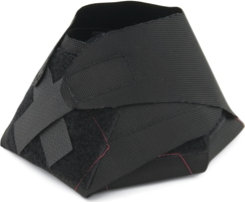I have always thought that since a horse tolerates us being on his back, it's only fair that we are responsible for keeping that horse out of trouble. If your horse gets kicked by another horse, it's usually your fault for getting too close. If you can't see where you are riding and end up with the horse's front legs in a bog - then it ain't his fault now is it? The same with walking on top of a rattlesnake in most cases, and certainly in case where you are riding on a trail.
This time of year as the weather gets cooler, rattlesnakes are more active in the day time than they are in the heat of the summer. In a couple months they will be denned up, so they are hunting more often to sustain themselves when they brumate (sort of like hibernation). Always the exception though. As a Range Rider I've had been called in cold winter months to remove rattlesnakes posting a threat to work crews, but it was likely the construction drove them from their dens - in a less than happy state of mind after being disturbed from their brumation I reckon.
And also this time of year, the baby rattlesnakes, aren't much bigger than when they were when born alive, are a particular hazard as they are born with a full venom sack and can't control the amount of venom they put into a target thereby releasing a full load, and they don't have a rattle, just a button so they can't deliver a warning. In fact, my wife and I were riding out to meet some people on the Butterfield Trailhead and talking about rattlesnakes as our horse shoer was struck in the ankle last week, fortunately he had hiking boots ankle high and his bunched up wranglers provided a barrier that the rattler's fangs did not get through. Anyway, I told her that it is common for someone to be bit without the snake first giving that tell tale and hair raising rattling warning. I said many times I've walked or rode through the desert only to have the first 2 or 3 people go right past a rattlesnake and nobody knew any better until the snake rattled at the 4th person.
My wife knows that they don't always rattle as she has almost walked on top of a rattlesnakes in the past couple of years. I've also watched several people do the same. Not going to happen to me, or so I thought. With several riders ahead of me on a fairly wide trail about 2 horse's wide, I was talking to someone else about the fires that have devastated the West and how the smoke from Montana fires are blowing into Northern Colorado, when my wife calls out "Snake,..you're on top of him!" I goosed my horse into an immediate lope departure for a few strides then turned to look back. Sure enough, a Prairie Rattler was slithering away then coiling to face us. My wife thought my horse's immediate jump into a lope indicated he was bitten, but thankfully not so. And doubly thankful so as our lope departure was not particular well executed.
My wife later said that it looked like my horse's back foot either stepped on or just over the snake and flip him over as we moved forward. Again, thankfully not bit. So I checked the other riders position, gave them a warning and shot the snake with a .45 Long Colt Snakeshot round. Killing rattlesnakes puts me at odds with my wife when it is off our property or they are not an immediate danger to someone. It gives me no pleasure to kill anything, but many riders use these trails and bring their dogs with them, so I did what I did.
Venomous snake bites can kill a horse depending upon the type of snake, amount of venom injected, and health of the horse, but will certainly cause pain, likely swelling and will require immediate Veterinarian treatment which may include cleaning and caring or the wound, pain meds, a tetanus booster, anti biotics and even anti-venom. Horse's are often bit on the nose as they try to investigate the small creature in front of them. As horse's breathe through their nose, the usual swelling from a bite on the nose can occlude their airway so it is vitally important that the airway is maintained. If you get and your Vet get your horse through a snake bite, you will likely face complications down the road which you'll have to treat symptomatically. Hope you don't experience that. Hope I don't either so I be doubly careful from now on, hope you are too.



















No comments:
Post a Comment